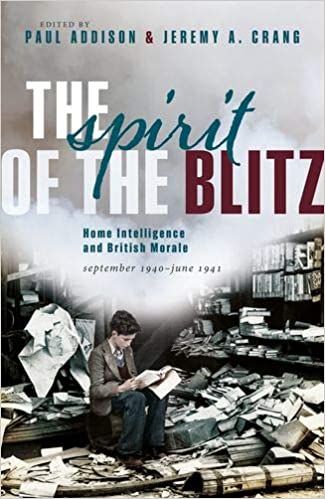The Spirit of the Blitz – clandestine reports reveal what the British people were really thinking

This month marks 80 years since the start of the Blitz. The Spirit of the Blitz brings together a complete and unabridged sequence of clandestine reports compiled by Home Intelligence to gauge levels of morale during the months of September 1940 – June 1941. Delivered to Home Intelligence by teams around the country, from the postal service to the WI, the reports sought to convey what normal people were really thinking about a range of topics – politics, the bombings, food shortages, the state of shelters, news coverage, people of different nationalities and faith, rumours that were spreading, and lots more. Introducing the reports, the authors, Paul Addison and Jeremy Crang, explain how and why the reports came about and reveal some of the brick walls they faced along the way.
Weds Sept 11th 1940: “A certain amount of anti-Semitism in the East End still persists, but this is not so much on account of a marked difference in conduct between Jews and Cockneys, but because the latter, seeking a scapegoat as an outlet for emotional disturbances, pick on the traditional and nearest ones. Though many Jewish people regularly congregate and sleep in public shelters, so also do many of the Gentiles, nor is there any evidence to show that one or other predominates among those who have evacuated themselves voluntarily through fear or hysteria.”
“A new development is that London Jews who have stayed behind are themselves showing signs of turning against the Jewish evacuees. In certain London shelters, the Jews are segregated from the Cockneys, and remarks are made that the Jews arrive earliest at the shelters. Though the strong family and property ties of the Jews naturally cause comments, there is little evidence to suggest that in fact Jews are behaving any worse or better than Cockneys. If anything, the naturalised alien minorities tend to arrive at shelters before either Jews or Cockneys.”
“The billeting of Catholic children in Wales has proved especially difficult; one priest even urged them to return on the ground that spiritual was more important than bodily safety.”
“Most schools reinstituted a full-time programme six months ago, but many have now been damaged and attendance is poor owing to the long distances that must be travelled and the fact that in practice Catholic children cannot be made to attend non-Catholic schools.”
“Eire’s refusal to grant the use of naval bases to Great Britain continues to rankle… discussion of this problem and arguments about the bombing of Rome are said to have ‘stirred up a religious controversy and considerable bitterness between Catholics.”




